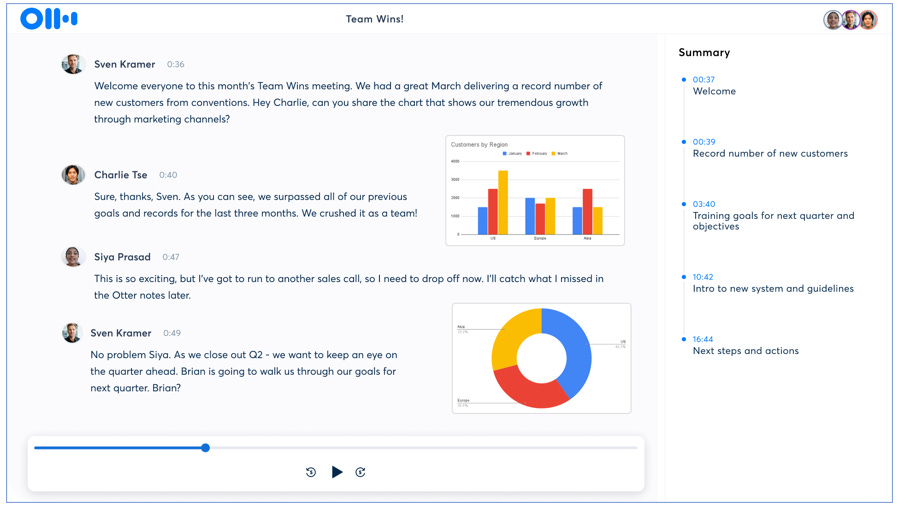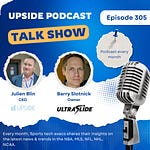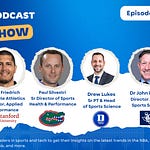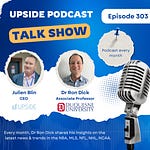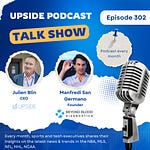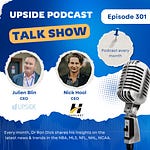This week, we have the honor to interview Sam Liang, CEO of Otter.ai, a leading transcription and summarization platform for enterprise collaboration.
Founded in 2016 by Sam Liang and Yun Fu, Otter.ai is a Mountain View, California-based technology company and a leading tool for meeting transcription, summarization, and collaboration. Using artificial intelligence, Otter generates real-time automated meeting notes, summaries, and other insights from in-person and virtual meetings - turning meetings into accessible, collaborative, and actionable data that can be shared across teams and organizations.
When Yun Fu and Sam Liang founded Otter.ai they wanted to find out if AI and NLP was advanced enough to build an automated note-taking tool. The goal was simple - to make conversations more valuable. Once launched, millions of customers quickly signed on to Otter to make their conversations more actionable and accessible - some of earliest adopters include journalists, students, people who are deaf or hard of hearing.
Picture: Otter.ai dashboard
Then in 2020, hundreds of millions of professionals switched to video meetings, and Otter became a critical tool for remote teams all over the world. The virtual meeting market exploded, with over 300 million daily Zoom users, many of whom began connecting Otter automatically to their video calls, to capture and share notes from every meeting.
Since then, Otter has become a growing part of work, from the company's partnership with Zoom Video Communications in 2020 to the launch of Otter Assistant with Zoom, Microsoft Teams, and Google Meet in 2021 to new OtterPilot features that provide more meeting automation - including the newly launched automated summaries.
Otter has the backing of several key VC firms with $63M of total funding and have attracted a world class team of advisors, including Adam Cheyer (co-founder of Siri), Larry Heck (co-founder of Cortana), and Greg Holmes (first Chief Revenue Officer of Zoom). Otter.ai has experienced tremendous growth - with over 1B meetings transcribed.
Here is a video explaining how to book sessions on the Otter.ai platform:
📝Show Notes: Through this interview, we touched on his background, his role, his company and product, the benefits for sports organizations to use his product. We also talked about his plans for the next 12 months as well as ChatGPT, and generative AI and future innovative use cases.
🚀Best Quotes: Here’s some of the key discussion points and best quotes from our conversation with Sam:
On his background at Google and the Silicon Valley:
“I was born in Beijing, China. I grew up there, studied computer science in college. Then I came to America in 1991, so it's more than 30, 32 years ago. Later I did my PhD at Stanford. After that, I worked for a few high tech companies. I joined Google in 2006 where I led the Google Map location platform, which powered the Google Mobile Map app, which is one of the most popular apps in the world”.
“I quit Google in 2010 to build a mobile startup in Palo. It was later successfully acquired. Then in 2016, with my co-founder Yun Fu, we started Otter.ai in Mountain View, CA”.
On how he got the idea to start Otter.ai:
“One is that, when building a startup, I have to talk to a lot of people. I have a lot of meetings. I found that it's hard for me to remember so much information. It's hard to remember my action items, and it is hard to share information with our team. I talk to a lot of Venture Capitalists, and I talk to a lot of customers. And we need to do recruiting to build the team. So I have a tons of conversations. So there's a big pain point for me and our team”.
“On the other hand, technically I'm fascinated by voice, and the tremendous amount of voice data in the world. If you look at human history, the audio recorder was invented by Thomas Anderson in the 1800s around 1877 I think”.
“No audio data was even captured even after the recorder was invented. Still, most voice data was not captured. And for those that were recorded, most of them didn't have transcripts. So it's very hard to search for information and not to mention, analyzing the data. So we see that there's a tremendous amount of value if we capture voice, transcribe it, and analyze it. That's how I got the idea of Otter.ai”.
On his company Otter.ai and platform:
“We have raised $63M so far. It's not the biggest startup in the startup world, but we are actually super efficient. We have about a hundred people. We built one of the best speech recognition and summarization engines in the world”.
“We have transcribed more than a billion meetings already, and we are probably one of the top three apps in the US. We work with the Zoom platform, Microsoft Teams, Google Meet, so we are platform agnostic. Our mobile app is also popular on Apple App Store and Android, so that if you meet someone in person, you can use Otter.ai as well. So everything is saved in one place, no matter where your meeting happens”.
On how the Otter.ai platform works:
“The UI is super simple. If you synchronize your calendar with Otter.ai, and whenever you have a Zoom meeting, Google Meet Meeting or Microsoft Team meeting, Otter will automatically join your meeting at the beginning. It provides a live transcription. It captures any slides used in the meeting automatically. You don't have to do anything. Otter uses a vision algorithm to detect the slides and put them into the transcript”.
“So your transcript is a rich note. You can highlight anything important, as well as action items. We're working on new algorithms that detect action items. And at the end of the meeting, Otter will provide a summary for your meeting. It also recognize each speaker and how much each speaker talks, what the keywords are, and what each person discussed”.
“A lot of enterprises are currently using Otter for their team meetings. There a lot of researchers, whether they're in the industry or in the sport world, and probably the coaching aspect, that can be captured on Otter as well”.
On the fact that Otter.ai has investors from the sports world:
“We have a couple of investors actually from the sport world. Harris Barton, who is a former NFL player who won three Super Bowls with the 49ers. Also James Pallotta from the Raptor group. He is a co-owner of the Boston Celtics”.
On Otter.ai’s competitive advantages:
“Number one, we have a very advanced AI system. We started building this since 2016. We focus on speaker conversations. It's just actually more than the system used in Siri or Amazon Alexa because those products can only handle one speaker. We actually handle multiple speakers and a long form conversations”.
“This is important because in the meeting, which lasts an hour, and can involve five or 10 speakers, we need to understand who talks about what. And then the summarization is complicated to understand all the key topics people discussed”.
“You were going to ask about ChatGPT. We've been working on this conversational AI or ChatGPT since 2016. As I mentioned, whenever you view AI, data is critical because we transcribe meetings already, and every day we're generating a lot more meetings that can definitely contribute a lot to the AI training system because without enough data, you cannot build a good AI”.
What Otter.ai customers like the most (user friendliness, convenience) about the Otter.ai platform:
“What our customers like the most is the user friendliness and the convenience of it. As I mentioned, once you set it up, you don't need to remember doing anything. Otter can just join your meeting on your behalf if you cannot join personally. So people actually can use this to skip some meetings that don't require their live contribution”.
“We have done research in a study that shows that 30% of the meetings in enterprises are not absolutely necessary for every person to join. So everybody is suffering from meeting fatigue these days (…) Otter.ai can reduce people's fatigue and actually improve their productivity”.
On Otter.ai’s business model:
“Our business model is a SaaS model. Anyone can sign up for free and start using it. Once they like it and they need to use Otter for more meetings and use more advanced features, they can buy a subscription”.
“So our business model is actually quite similar to many other successful SaaS companies like Slack, Sana, or Figma. Once people start using it, they share it with their colleagues because the meeting knows usually when it's shared with all the meeting participants”.
“Then it starts the viral loop. The product grows by itself when people use it. And then in enterprise, when they see that they have hundreds and possibly thousands of employees who are already using Otter, many of them decide to buy an enterprise license”.
“The price range of the enterprise license depends on the feature set. It could range from $20 to $30 to $40 per month per user”.
On his plans for the next 12 months:
“We're investing a lot more into AI to build more intelligent AI systems to even better understand human conversations because obviously conversations can be complicated, especially when you have multiple people involved. If you look at ChatGPT, it is a one-on-one chat between a human and a robot”.
“It's a very simple interaction. Once you have multiple people talking to each other, it's way more complicated. How do you know who agreed with whom? To what degree and what's the sentiment involved?
“So our focus compared to ChatGPT is a multi-speaker chat system. And also we see that Otter can participate in the future in live meetings instead of just taking notes. Otter can answer questions during live meetings. So those are the technologies that we are developing”.
On the type of future use cases that Otter.ai will be able to support:
“Let me give you an example. For our own company, all our meetings in the last seven years are in the Otter.ai system. If I ask Otter during a meeting, we're discussing a product release, we say, Hey, what's the status of that? It doesn't have that information, but our own system does because it hooked up with our own back tracking system. Otter can look up the status of that and can provide the answer right away”.
“In addition, with our own system, we actually have knowledge of all the employees, who the names of each employee, the role of every employee.
So if I mention that the person has said, “Michael will do that”, Otter actually knows which Michael we're talking about, and it could just assign an action item to that person in the system”.
“Or maybe you could say something like, Hey, can you check Michael's availability to attend the next meeting, and maybe we will check the scheduling system and see when that person is available. And as I mentioned, everything is encrypted. It's confidential. The machine can do the lookup, but, we're not able to see there any proprietary data”.
“Otter will be an essential part in people's daily workflow. And it's already integrated with Calendar. You can join your Zoom meeting, Google Meet meetings, Microsoft team meetings. It will be integrated with other products like Salesforce CRM systems, or project management systems like Jira, Asana, or chat apps like Slack or Microsoft Team Chat. We'll track and capture all the conversations”.
“You can always find things in your own meeting and a lot of meetings in enterprises are open to people in the company. So when you ask a question, maybe that question was already answered by another person in another meeting. So others can get the answer that way, rather than having you schedule another meeting with that person”.
On his view on ChatGPT:
“It is super impressive in the sense that it is able to understand your question, and generate a coherent answer, which is not always correct”.
“And then when you give follow up instructions, it actually remembers all the information and then refine the answer based on follow up question. It's all really impressive”.
On the current limitations of ChatGPT and how Otter intends to fix those issues:
“Secondly, if you look at ChatGPT it's trained on public data. It doesn't have proprietary information in any enterprises. So if you ask ChatGPT anything related to your own enterprise, it doesn't have any knowledge”.
“So we are building a system that can incorporate proprietary information into the system. Of course all this data is encrypted. So this will just further improve people's product and provide attractivity service type of services in enterprises, which have their customized knowledge”.
You may also like:
🔥 Upside Chat: Dave Hancock, CEO, Apollo (Leading Athlete Management Systems (AMS) vendor)
🔥 Upside Chat: Ismael Fernandez, ThermoHuman CEO
🔥Upside: AMS Ecosystem Analysis: Key Trends, Vendors and Recommendations to Teams



